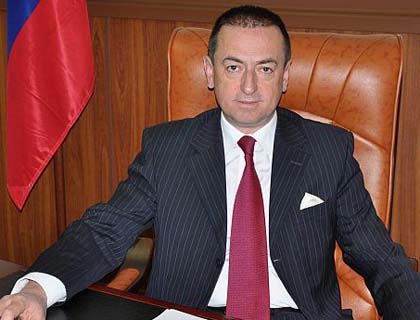KABUL - Russia hopes to embark on a series of ambitious construction projects in Afghanistan aimed at reinforcing fragile stability in the country where Soviet troops fought a disastrous, decade-long war, its envoy to Kabul said Thursday.
Though not connected by land, Moscow sees war-ravaged Afghanistan as a neighbor and is concerned by what it describes as the two-pronged threat of drugs and terrorism which reach Russia through ex-Soviet Central Asian countries.
Andrey Avetisyan said Russia had limited involvement in Afghan reconstruction over the last decade "because it was all about fighting, and since we are not fighting, we didn't see much place for our activity."
But that approach has changed. "Now, we're trying to kind of start anew," he told Reuters in the glistening rebuilt embassy, a third of its Soviet size during the war, whose end 23 years ago Wednesday was marked by Afghans and Russians.
Russia hopes to begin with reconstructing around 150 Soviet-era projects, from Afghanistan's most important stretch of highway, the congested and aging Salang tunnel, to a Kabul bread factory that once fed the entire Afghan security forces.
For these, many of which were built by Soviets before they invaded in 1979, the same technology, documentation and even the same engineers still exist, meaning the Russians are in prime position to take over the work, Avetisyan said.
Moscow then aims to delve into new ventures, involving oil extraction, hydroelectric projects, housing and possibly even build the country's first railway network.
The Asian Development Bank a year ago estimated Afghanistan's infrastructure requirements at more than $4 billion.
Avetisyan declined to put a price tag on the Russian projects, but said a meeting in two weeks in Moscow, with Afghan Finance Minister Omar Zakhilwal, should shed more light on the exact proposals and what will be agreed upon.
Russian gas export monopoly Gazprom, oil major Rosneft, state railway firm Russian Railways, second-biggest oil producer LUKOIL and state power holding company Inter RAO, as well as others, were interested in concrete projects in Afghanistan, he said.
"We're not going to tell the Afghans how to live, which life to live -- we stopped doing this 25 years ago," said Avetisyan, who worked for the Soviet government in Kabul, becoming fluent in Afghanistan's two main languages, Dari and Pashto.
"We just want to have a friendly, independent Afghanistan as our neighbor... Economic development should go first, because there cannot be security without (this). The roots of insecurity are in the problems for people to find jobs, have a home."
"PAST TEN YEARS ALMOST WASTED"
Escalating violence across Afghanistan in the 11th year of an increasingly unpopular war has sent tremors of worry across Russia, which borders mainly Muslim former Soviet republics in Central Asia, and which is battling a growing Islamist insurgency in its own volatile North Caucasus.
The flow of Afghan heroin, branded a threat to national security by the Kremlin, has also set off alarm bells in a country which health officials warn is the world's top user of heroin, spurring a crippling HIV/AIDS epidemic.
Underscoring those fears is the looming deadline of end-2014 for NATO to train a 350,000-strong force of Afghan police and soldiers who will take over all security responsibilities from foreign combat troops, who will also leave by that time.
Avetisyan said Washington was at risk of repeating the errant ways of its Cold War foe in approaching Afghanistan. "They (the U.S.) came 10 years ago, thought they could fix it very quickly, and then leave. Exactly the same mistake that the Soviet army made," he said of its dispirited 1989 exit from a war that took 15,000 Soviet lives.
After the Soviets rushed out, the Afghan communist government collapsed, leading to infighting between warlords and a vicious civil war that reduced much of Kabul to rubble and paved the way for the Taliban's rise to power in 1996.
Avetisyan lamented the slow economic development over the last decade, echoing the discontent of many ordinary Afghans who accuse the U.S. force in their country of not building enough.
"The past ten years were almost wasted in this sense," he said.
"... Why have the Americans achieved so little in terms of economic development? Because it is not in their plans and it still is not, I am afraid." (Reuters)

